On October 20th, the Department of Agriculture’s state veterinarian announced the first confirmed COVID-19 positive cat in Pennsylvania from Cumberland County. The cat resided in a household with multiple positive COVID-19 humans. The 16-year-old cat did show some respiratory illness and treatment was pursued. Common respiratory diseases were initially ruled out before testing for SARS-CoV-2. The cat was euthanized due to the progression of respiratory signs. The case is still under investigation and a primary cause of death has not been determined.
No pet has died directly from COVID-19
Over the past few months, there have been a few trends that have surfaced regarding COVID-19 and our beloved pets. First, only a handful of pets have tested positive, especially when compared to the number of humans that have tested positive. Second, the handful of pets that have tested positive have been in contact with one or more COVID-19 positive humans. All positive pets had known prolonged exposure to COVID-19 positive humans. Lastly, as far as we know, no pet has passed away directly from COVID-19. The COVID-19 positive pets that passed away were generally older with underlying health issues.
Positive pets have prolonged exposure to COVID-19 positive humans
Unfortunately, there have been a large number of clinical signs in humans associated with COVID-19. In pets, clinical signs may include respiratory (sneezing, coughing, eye/nose discharge, difficulty breathing), fever, lethargy and/or GI signs (vomiting, diarrhea). It must be stressed that more common causes have to be ruled out before pursuing a COVID-19 test for your pet, especially if your pet has not had prolonged exposure to a COVID-19 positive human.
Pets do not play a significant role in spreading COVID-19
The best way to protect your feline family members if you are positive for COVID-19 are…
• Avoid contact with pets (i.e. similar to a self-quarantine from other humans) including petting, snuggling, facial contact, holding and sleeping in the same bed.
• Have someone else care for your pet during your quarantine.
• If you cannot have someone else care for your pet, wear face masks, wash your hands, etc. as you would with other human contact.

